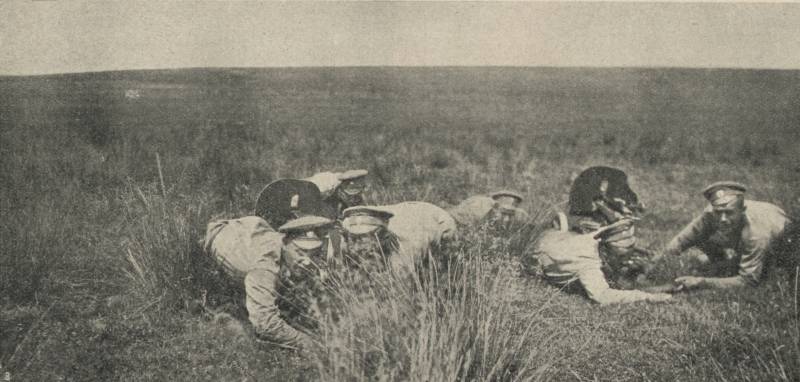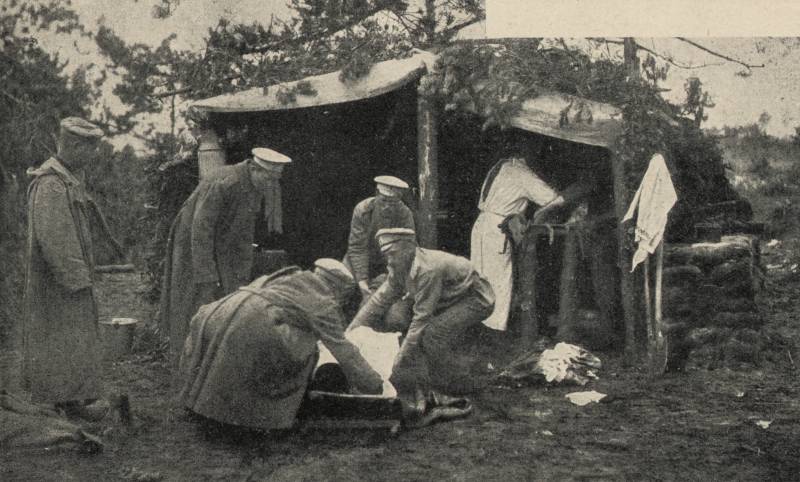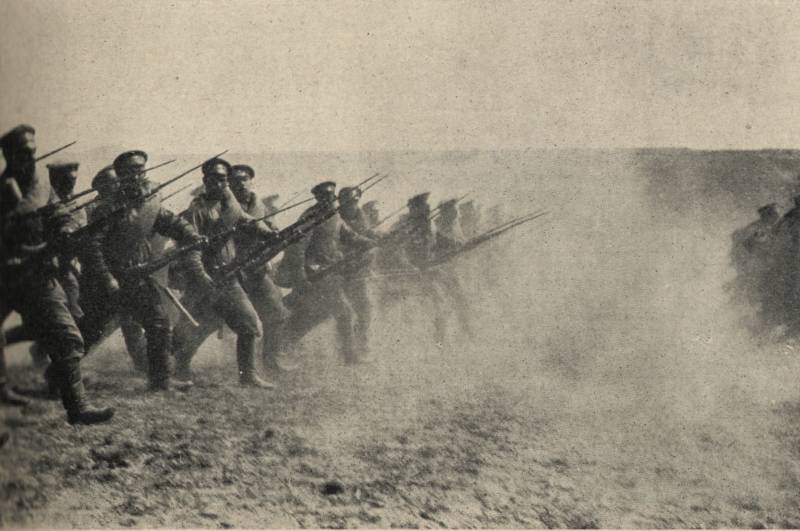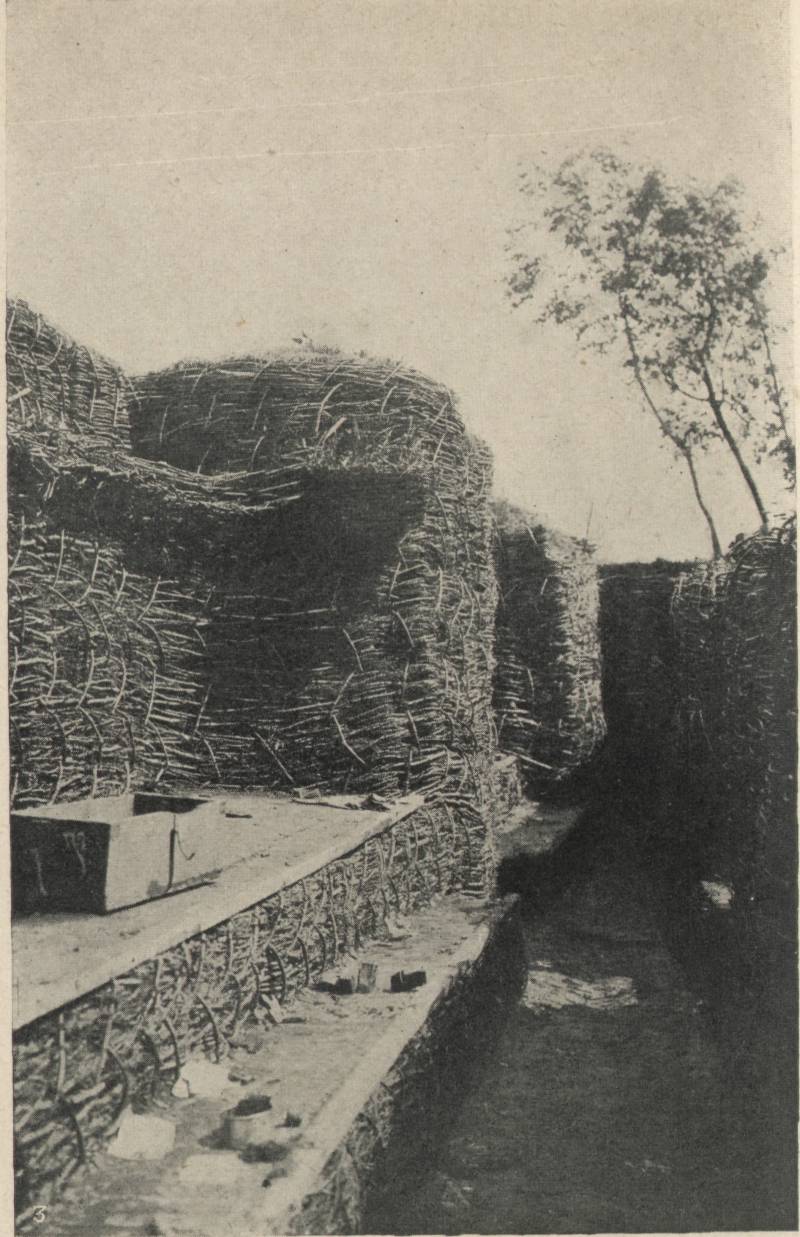Vladimirskaya height
In the 10 hours of 36 minutes, carried away by the example of their officers competing in valor, the companies of the 4 and 1 battalions famously went on the attack - despite the stormy artillery (heavy and light batteries) and strong rifle and machine-gun fire from the front and flank - and in 4 minutes passed through the enemy wire. In this case, the commanders of the 4 th company, Lieutenant Schwerin, and the 14 th company, Ensign Lapshin, especially distinguished themselves - setting an example to their companies, they were the first to jump into the enemy's trenches. In the enemy's trench, Lapshin died the death of the brave, and Schwerin captured a mortar and bomb. The commander of the avant-garde half-company 13 of the company, Ensign Mishchenko, setting a personal example of courage and courage, first ran up to the parapet of the enemy's trench, capturing the current machine gun - about which he fell, wounded in the side. At the same time, Ensign Bibik, commander of the 2 th company, captivated his company with his personal example, brought her to a blow at bayonets and took the portion of the position indicated to him. Following the avant-garde semi-bombs, the other semi-bursts, as well as battalion reserve companies, broke into the enemy’s position - the latter began to move to the right and left, knocking out the enemy and expanding the breakthrough.
With the capture of enemy trenches and the expansion of the breakthrough, Ensign Veleslav distinguished himself - during the attack of the second line of the enemy, dragging the 6 company behind him and setting it as an example of selfless courage, he first jumped into the enemy's trench, where he fell, hit by an enemy bullet. Sub-lieutenant Nikonov and senior non-commissioned officer Faynitsky seized the current machine gun - killing the enemy's 2 machine guns. Some companies reached the Vorobyevka-Tsebrov road, where under heavy fire and light artillery of the enemy about 12 hours 40 minutes repulsed the first enemy counterattack from the side of Tsebrov. Light and heavy batteries supported infantry.
The enemy launched the second counterattack in the 14 hour from the side of Tsebrov - by forces around the 3 battalions. The attack was fierce - the enemy, supported by heavy fire and light artillery fire and machine guns, reached the mouth of the Russians, but the Vladimir residents, inspired by the example of the section commander, Lieutenant Colonel P.-F. A. Ashe, who stood on the parapet and personally led the battle, let the enemy in, point-blank by shooting him, and then knocked them down with bayonets. The 2-i, 4-i, 5-i and 6-i batteries of the 16-th artillery brigade and 4-i heavy battery took part in repelling the attack.
The third counterattack was conducted by the enemy with the support of the same powerful fire and about the same forces and with the same bitterness. It took place around the 14 hours. At the beginning of the counterattack, Lieutenant Colonel P.-F. A. Ashe, who was standing on the parapet, was twice wounded by a bullet in his hand and handed over command of the battalion to Lieutenant Martysevich.
1. Machine gunners nominated.
The position of the battalions at the height of 369 was very difficult - to bring the cartridges was very difficult because of the barrage of enemy artillery fire. Water for people and machine guns also remained low. Almost all fighters who brought cartridges, grenades and water were killed or wounded while passing through the barrage of enemy fire.
In 17 hours 30 minutes, the division commander gave the order to change the Kazan residents at 369 (at nightfall). But Vladimir Putin had to live to see this shift - and withstand one more counterattack, which took place after 18 hours.
The enemy’s heavy and light artillery opened hurricane fire, and soon a cluster of Austrians was found in the message trenches near Tsebrov - no less than the enemy’s 5 battalions went into the counterattack. Pitying the cartridges, the Vladimir residents let the Austrians on 100 - 120 steps up and only then opened fire on the attacking enemy chains. Our machine gunners climbed out of the trench - acting on the orders of ensigns Gorokhov and Gaberling. Both officers, standing outside the trench under heavy enemy fire, personally supervised the installation and firing of machine guns, indicating targets.
To better see the advancing Austrians, the companies also left the trenches - taking an example from their officers: Lieutenant Martysevich and ensigns Suprun and Balakin. The fourth counterattack was repulsed - the Austrians, unable to withstand the Russian fire, backed off, leaving the dead and wounded.
But from the front and to the right of Tsebrov, the Austrians launched the fifth counterattack (by forces of at least 4 battalions), supported by heavy and light battery fire. Despite the huge losses from artillery, machine-gun and rifle fire, the Austrians, reinforced by fresh forces, stubbornly wanted to dislodge the Russians from a height. There were few cartridges left, and machine guns without water refused to work. Then, on the orders of Captain Nikolaev, people collected urine in kettles - which was poured into the casings of machine guns. This made it possible to repel the fifth counterattack with fire.
But the enemy's hurricane artillery fire created a fire curtain interrupting the communication with the rear - and the cartridges to the front line stopped.
2. Dressing station.
The Russian artillery helped with its fire to repel the enemy's counterattacks, firing on the Austrian closures north of Tsebrov.
In the 22 hour, taking advantage of the onset of darkness, the enemy launched the sixth counterattack - with forces of at least 4 battalions, supported, as before, by hurricane fire. In this counterattack took part and the enemy, who were sitting in the trenches on the flank. The enemy was advancing from Tsebrova, from Vorobyevka and from the Russian position. From the last direction, the Austrians attacked with a shout of “their own” - only the lighting rockets made it possible to determine what kind of “their own”. Captain Nikolaev ordered the 4-th company to take the trench front east, and part of the forces took the message from the enemy’s first trenches to its outpost with the front north. With almost no ammunition, but retaining the courage of the spirit, officers and soldiers hoped for their bayonets.
This counterattack was repelled by a friendly bayonet attack. With a shout of "Hurray," the remnants of their mouths jumped out of the enemy's second line of trenches and, led by captain Sergeyev, lieutenant Martysevich and ensigns Suprun, Balakin and Lobanov, rushed forward. The Austrians, who did not expect such a maneuver, rushed back, and part of their first chain threw down their rifles and surrendered to captivity.
3. Fight.
The night fell, but the enemy’s artillery and mortar fire continued. Having found a large supply of rockets in the Austrian trenches, the Vladimir inhabitants kept the whole area under continuous illumination. Taking advantage of the comparative lull, Captains Nikolaev and Sergeyev sent a report to the regimental commander on the situation at 369. The latter reported that the battalion of the 64 Infantry Regiment of Kazan was already being replaced.
Before the arrival of Kazan, the enemy, after one o'clock in the morning, held the seventh counterattack - by three battalions. The attack was repelled exclusively by psychological influence — the Vladimir without a bullet jumped out onto the parapet with a shout of “Hurray!” And prepared to meet the enemy - but the last one, who had experienced the full strength of Vladimir bayonets, fled ...
On this memorable day for the regiment, Captain Nikolayev especially distinguished himself - thanks to his selfless courage, composure, firmness and discipline of the 3 battalion of the Vladimir battalion, they firmly held the position they had seized and, although they thawed out from the hurricane fire and counterattacks of the enemy, they did not give up their position until the change fresh in parts - for more than 12 hours. Captain Nikolayev was contused and bruised, but did not leave the ranks, continuing to lead the units entrusted to him and all the time being in mortal danger.
Captain Sergeyev, who received the 4 Battalion after injuring Lieutenant Colonel Ashe, also showed his inherent courage, perseverance and firmness. He, too, was contused, but did not leave the ranks, and, in danger, he gave his subordinates an example of personal courage, successfully repulsing the enemy’s counterattacks.
4. Captured Austrian trenches. Backed by logs of brushwood.
Outstanding were the exploits of the lower ranks.
So, when the 2 Company reached the 1 line of the Austrian trenches and wanted to move on, it turned out that there were land mines behind this line. Despite the mortal danger, the sappers, ordinary Yaroshchuk and Slepchenko selflessly rushed forward and cut the wires from the land mines, opening the way for 2's company of Ensign Ensign Bibik.
An ordinary 13 company Nozdrachev was sent to find out how much the enemy’s barriers were destroyed by artillery. Crawling up to the barricades, Nozdrachev came across an Austrian guard. The latter tried to capture the fighter. Nozdrachev did not lose his head and opened fire on the guard, forcing the Austrians to return to his trench. After that, after examining the barricades, Nozdrachev returned to his.
The senior non-commissioned officer of the 6 Company, Platon Mishchenko, after the company commander was out of action, took command of the company. Mishchenko inspired the soldiers, while counterattacking the enemy, he took the remnants of a company into a bayonet attack - and repelled the enemy onslaught.
When the enemy barriers were destroyed by artillery fire, the working teams and grenadiers moved forward - they had to clear the aisles. Ordinary 14 companies - Ivan Maltsev, Anton Bykov and Timofey Shitkovsky - under the enemy's artillery and machine-gun fire, ignoring the deadly danger, standing to their full height, cleared the aisles.
The junior non-commissioned officer of the 14 Company, Sergei Gladky, seeing that an Austrian officer was aiming at ensign Lapshin, rushed to save the life of the company commander - but he was late, as ensign Lapshin had already fallen dead. The murderer of the ensign - an Austrian officer - rushed to run, but Gladky caught up with him and stabbed him with a bayonet.
The junior non-commissioned officer of the Xnumx Company of Wroblewski, seeing that Warrant Officer Mishchenko, who had reached the enemy’s machine gun, was wounded, he perekolol the calculation of the Austrian machine gun. As the document notes, the non-commissioned officer was distinguished by a great deal of management, being an example of other lower ranks.
5. Party of captured Austrians.
During one of the enemy's counterattacks, two corporal 14 companies: Vasily Andreev and Nikolai Pomytkin, were the first to rush at the attacking enemy and personally killed the 11 people. When, seizing the initiative of two corporals, a part of the company ran up, they succeeded in capturing the Austrians 54.
The medical orderly of the 14 th company, the corporal Ivan Andreev, under the hurricane artillery, machine-gun and rifle fire of the enemy, being in the front row, made bandages to the wounded and endured the seriously wounded.
And the junior non-commissioned officer of the 15 Company Pozdeev, during one of the enemy’s counterattacks, rushed into a group of Austrian 16 - 6 killed them, and 10 took prisoner.
The ensign 15 of the company Chepurnov with Private Shepherd rushed to the 12 man calculating the mortar, drove them into a shelter and, disarming, captured.
During enemy counterattacks, Ensign Kucherenko, bursting far ahead and surrounded by Austrians, shot all the revolver cartridges and fought off enemy soldiers with a spatula. And an ordinary 16 of the Kolesnikov company, a soldier who had killed two Austrians, rushed to the aid of his officer. And when another five lower ranks ran up, they managed to capture 23 captured enemy soldiers.
The corporal 4 of the company, Ivan Tarapun, despite the hurricane artillery and machine-gun fire of the enemy, carried a seriously wounded warrant officer Shablinsky on his hands from a wire fence - and the officer was given medical assistance.
Vladimir gunmen also distinguished themselves.
The corporal of the machine-gun team Razdobudko, being wounded, continued to carry ammunition through the fire screen in the hollow east of the 369 height - until it was killed. And Kalyakin, an ordinary machine-gun team, despite the enemy’s fire curtain, carried water for the machine guns several times - and being seriously wounded.
The soldier of the machine-gun team Kirpichev, despite the wounding of the arm, continued to fire the machine gun until he was shot in the side with a bullet.
The senior non-commissioned officer of the machine-gun team Bushuyev, being under stormy artillery fire, collected ammunition from the dead, put them in machine-gun belts and supervised the shooting of machine guns — all the while on the parapet under the bullets of the enemy.
Despite the heavy fire and light artillery of the enemy, the corporal Sukhorukov’s machine-gun team rolled the machine gun to an open place and began to mow down the advancing Austrian chains until the machine gun was destroyed by a heavy projectile. Heroic calculation was lost.
And even the five sappers, attached to the 15 th company, during the enemy's counterattack, seized free rifles, several times they ran into bayonets.
This is just one battle of one of the masses of infantry regiments of the Russian imperial army - the officers and soldiers of which acted harmoniously and tactically competently, showing resourcefulness and mass heroism.





Information